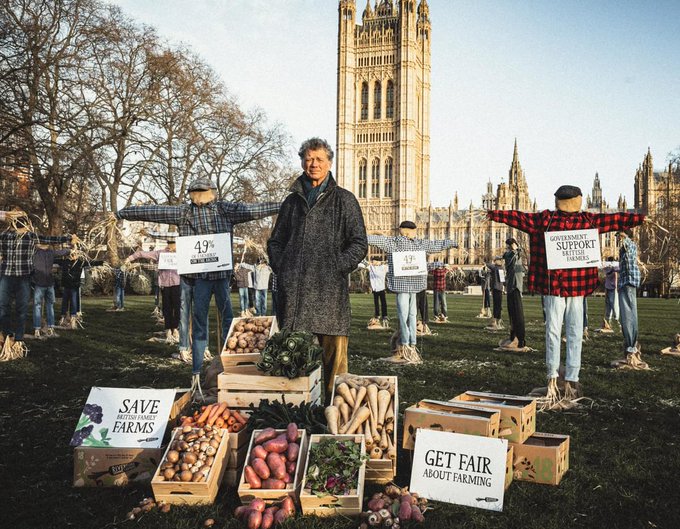Farming Minister Mark Spencer has confirmed the Government’s intention to introduce new legislation governing pig contracts in the summer.
Mr Spencer was speaking at the end of a debate on fairness in the food supply chain, prompted by a petition set in motion by Riverford Organic Farmers’ Guy Singh Watson, as part of his Get Fair About Farming campaign.
Mr Spencer defended the Government’s approach to addressing an imbalance of power in the supply chain by pointing to reviews it had commissioned in the dairy, pig, egg and fresh produce sectors.
“We took powers in the Agriculture Act to enable the introduction of statutory codes of contractual practice to protect those farmers. The codes will apply to any business purchasing agricultural products directly from farmers,” he said.
“They will provide greater certainty for farmers by ensuring that clear terms and conditions are set out in contracts. We intend to tailor the powers to those sectors that need them, because we acknowledge that the problems experienced by each sector differentiate widely.
“We must avoid introducing broad regulation that places burdens on sectors that may not require intervention, but we must make ensure that we concentrate on those areas that do.”
The dairy sector review started in 2020 and Mr Spencer said Defra has worked closely with the industry to ensure that the regulations are ‘tailored and proportionate, and provide the flexibility required in a global commodity market’. “They will create a new enforcement regime, and we will appoint an adjudicator to oversee compliance for our sector-specific codes,” he said.
The dairy regulations are undergoing final checks before their planned introduction to Parliament ‘hopefully before the Easter recess’, he added.
The pork supply chain review started in 2022 but Mr Spencer said Defra ‘learned an awful lot’ from the dairy sector, enabling it to go through the pork process ‘much quicker’.
Defra has committed to developing similar regulations for the pork sector dairy, introducing new rules for supply contracts and to improve market transparency through better market reporting data.
“We have developed a proposal that sets out the main features of the new regulations. We have been discussing them with industry and we expect to introduce them in summer this year,” Mr Spencer said.
Giving evidence to the Environment, Food and Rural Affairs Committee last week NPA chief executive Lizzie Wilson was optimistic that the new regulations deliver ‘something tangible that will help promote fairness within our sector’.
She said the NPA was pleased with progress so far, particularly after Defra shared its latest outline version of the regulation for consultation with NPA members. “Virtually everything that producers and we have requested is actually within that policy document,” she told the MPs. “It’s not perfect, and some additional detail needs to be thrashed out, but it does look pretty robust.”
Fairness in the supply chain
The debate took place after Mr Singh Watson’s petition, which asks the Government to amend the Grocery Supply Code of Practice (GSCOP) to require retailers, to ‘buy what they agreed to buy, pay what they agreed to pay and Pay on time’, was signed by more than 100,000 people.
The petition highlighted a survey showing that 49% of UK fruit and veg farmers fear they will have to give up their farm within the next 12 months, and many raised concerns about the behaviour of supermarkets, with 69% agreeing that tougher regulations are required to redress the imbalance of power between farmers, processors and the supermarkets.
During the debate, MPs highlighted concerns about how farmers are often treated by retailers.
Conservative MP Sherryl Murray said ‘coercion’ by retailers sometimes squeezed the cost of a product beyond break-even .
“We must also look into the imbalance of power and risk. Pricing can illustrate the problem of unequal power and risk within the food supply chain,” she said.
Shropshire MP Helen Morgan (Lib Dem) said dairy farmers in her constituency are ‘feeling the squeeze and worrying about their future.
“If those producers go out of business, there will not be enough milk for UK demand and it will have to be imported,” she said, highlighting the environmental and animal welfare implications of importing milk.
“It is really important that we support dairy farmers to be paid a fair price for the milk they are producing.”
Devon MP Richard Foord (Lib Dem) highlighted Tesco’s recent 6.6% sales increase, which delivered £2.7 billion in profit. “It simply cannot be right that the big supermarkets walk away with so much money, when the people who actually put in the work to produce the food are not seeing it.
“The majority of British producers run fragile businesses that are already subject to the vagaries of the weather, without being held hostage by the key players in the food supply chain,” he said.
Hard bargain
Shadow Farming Minister Daniel Zeichner highlighted the ‘formidable challenges’ farmers have faced in recent years, including Brexit uncertainties, Covid and soaring costs.
“As we have heard, farmers’ tight profit margins have been squeezed at the other end by supermarkets and intermediaries driving a hard bargain. Too often, primary producers get a tiny portion of the final product price, and little or even no profit from selling into mainstream supermarket supply chains,” he said.
“Somewhere in the food supply chain, there is clearly an issue of unfairness and imbalance. Put simply, the reward must outweigh the risk if farmers are to continue producing food. For an increasing number of them, that risk-to-reward ratio is out of kilter.”
Abdicated responsibility

Speaking outside Parliament ahead of the debate in front of 49 ‘anonymous and silent’ scarecrows representing the 49% of farmers who fear they My have to quit, Mr Singh Watson said:
“The government have abdicated responsibility for food and farming policy to Tesco – and Tesco and the other supermarkets have destroyed British agriculture and, along with it, a lot of our environment, because it’s impossible for a farmer to farm well at the prices they are paid.”




